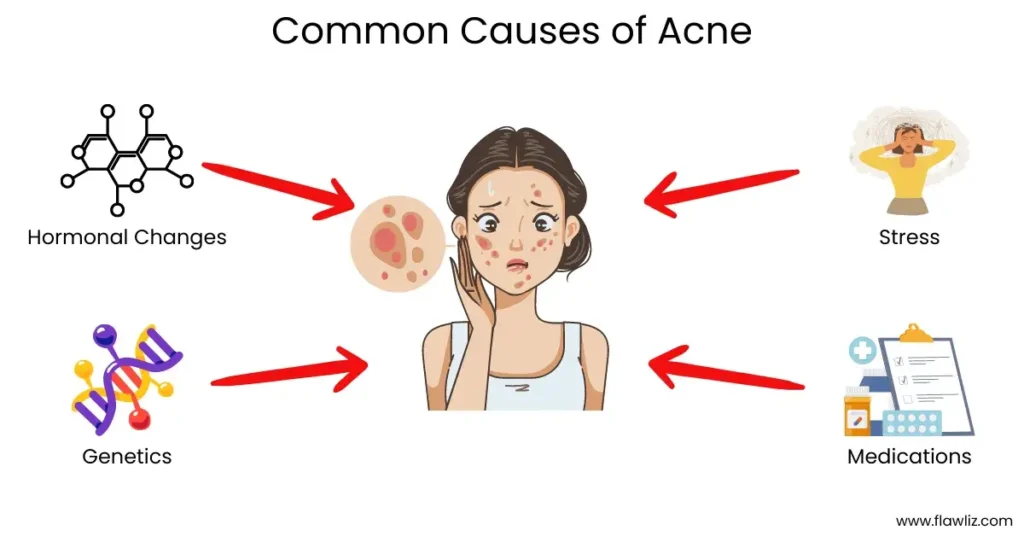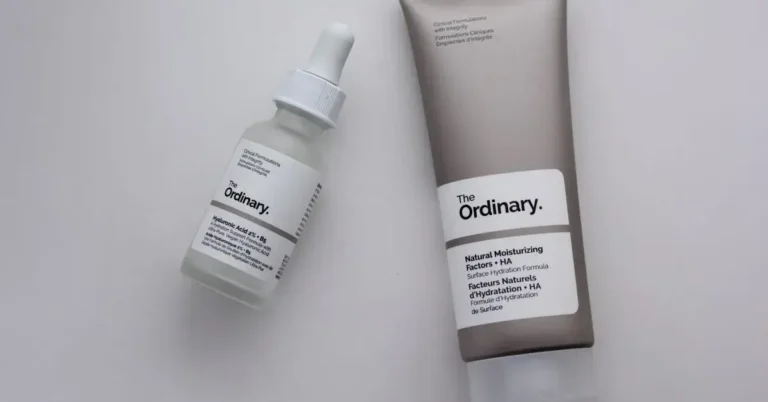Are you interested in exploring the intriguing connection between Hyaluronic Acid and acne? Imagine this scenario: Hyaluronic acid, a much-loved ingredient in skincare regimens, celebrated for its ability to moisturize the skin. However, there’s a surprising twist – there are whispers that it could potentially trigger acne.
In this article, we’re dissecting this skin saga. Hyaluronic acid might be like that friend you trust with your secrets, but what if it’s got a secret of its own?
Fear not, we’ll unravel the mysteries and shed light on safe skincare practices with a dash of humor, making this journey as engaging as a chat with your best buddy.
Table of Contents
Can Hyaluronic Acid Cause Acne?
While it is generally considered safe for use on the skin, there is a possibility that it can cause acne.
Acne is a common skin condition characterized by the appearance of pimples, blackheads, and whiteheads. It occurs when hair follicles become clogged with oil and dead skin cells, leading to the formation of a plug. This plug can become infected with bacteria, causing inflammation and the formation of a pimple.
Hyaluronic acid can cause acne as it can be comedogenic, which means that it can clog pores and lead to the formation of pimples. Additionally, if the product containing hyaluronic acid is not non-comedogenic, or if it is not formulated for the individual’s specific skin type, it can lead to the development of acne.
Please also keep in mind that everyone’s skin is different, and some people may experience no issues at all using hyaluronic acid, while some may experience acne breakouts. It’s important to pay attention to how your skin reacts to products and to consult a dermatologist if experiencing persistent acne.
Causes of Acne
Acne is a skin condition caused by clogged hair follicles with oil and dead skin cells. It’s responsible for whiteheads, blackheads, and other types of pimples.

There are several causes of acne, including:
- Hormonal changes: Hormonal fluctuations, such as those that occur during adolescence or pregnancy, can increase oil production in the skin and lead to the development of acne.
- Genetics: Acne can run in families and may be more likely to occur in individuals with a family history of the condition.
- Diet: Consuming a diet high in processed foods, sugar, and dairy products may increase the likelihood of developing acne.
- Skincare products: Using skincare products that are too heavy or oily can lead to clogged pores and the development of acne.
- Hyaluronic acid: In some cases, the use of hyaluronic acid-containing products may contribute to the development of acne. This may be due to the fact that the ingredient can be comedogenic, which means that it can clog pores and lead to the formation of pimples. Additionally, if the product containing hyaluronic acid is not non-comedogenic, or if it is not formulated for the individual’s specific skin type, it can lead to the development of acne.
What is Hyaluronic Acid?

Hyaluronic Acid, often referred to as the “hydration hero” has emerged as a prominent player in the world of skincare, revolutionizing the way we approach moisturization and rejuvenation.
At its core, Hyaluronic Acid is a naturally occurring molecule found abundantly within our skin, connective tissues, and eyes. However, it is its exceptional ability to retain water that makes it a coveted ingredient in skincare formulations.
Benefits
Dermaroller + Hyaluronic Acid serum. My pregnancy induced stretch marks were gone in about 3 months. I rolled once a week and used the serum every other day.
— Thato (@thato_xy) August 3, 2023
Hydration and Plumping Power: Hyaluronic Acid’s primary role lies in its remarkable capacity to attract and hold onto moisture. Like a magnet for water molecules, it can retain up to a thousand times its weight in water, making it an unparalleled hydrating agent.
When applied topically, Hyaluronic Acid creates a reservoir of moisture within the skin’s layers, effectively replenishing dehydrated cells and providing a plumping effect. This enhanced hydration not only revitalizes the skin’s appearance but also imparts a renewed suppleness that contributes to a youthful and radiant complexion.
Skin Moisture and Texture Enhancement: The effects of Hyaluronic Acid on skin moisture and texture are profound. By infusing cells with moisture, it helps maintain the skin’s natural barrier function, preventing trans-epidermal water loss and safeguarding against environmental stressors.
This barrier enhancement results in smoother, softer skin that feels more resilient and elastic to the touch. Fine lines and wrinkles are often diminished as the skin’s moisture levels are optimized, and the surface appears more even-toned and refined.
Possible Side Effects

- Skin Sensitivity: Some individuals may experience mild irritation or redness upon initial application. Conduct a patch test before widespread use to check for sensitivity.
- Breakouts or Acne Aggravation: While uncommon, a few users might notice an initial increase in acne or breakouts. This could be due to the skin adjusting to the increased hydration levels, if breakouts persist, consider adjusting the frequency or concentration of Hyaluronic Acid use.
- Allergic Reactions: Allergic reactions are rare but not impossible, if you have a known allergy to Hyaluronic Acid or related substances, avoid its use.
- Dryness in Certain Climates: In very dry climates or low humidity conditions, Hyaluronic Acid might draw moisture from deeper skin layers to the surface, causing temporary dryness. Applying a moisturizer over the Hyaluronic Acid can help mitigate this effect.
- Overhydration in Excessive Use: Overuse of Hyaluronic Acid in large quantities may lead to excessive hydration, making the skin appear temporarily swollen. It’s important to follow recommended usage guidelines.
In my experience, Hyaluronic acid is a very good skincare product. I have already benefited extremely, and also never really had problems with it. I can only recommend you to use it, and no worries side effects like acne are very rare.
How to Use Hyaluronic Acid Safely

While hyaluronic acid is generally considered safe for use on the skin, there is a possibility that it can cause acne.
To use hyaluronic acid safely and reduce the risk of developing acne, consider the following recommendations:
- Patch test: Before using any new skincare products, including those containing hyaluronic acid, it is important to patch test them on a small area of skin to ensure that they do not cause irritation or breakouts.
- Choose non-comedogenic products: Look for skincare products that are labeled as non-comedogenic, which means that they are formulated to not clog pores and cause acne.
- Use in moderation: Start by using a small amount of hyaluronic acid-containing product and increase the amount gradually as your skin becomes accustomed to it.
- Avoid overuse: Avoid using too many products containing hyaluronic acid, as well as other active ingredients, in a single routine as it can lead to irritation and over-exfoliation.
- Consult a dermatologist: If you’re experiencing persistent acne or other skin issues, it’s important to consult a dermatologist for personalized advice and treatment.
- Pay attention to skin reactions: If you notice that your skin is breaking out or becoming irritated after using a hyaluronic acid product, discontinue use and consider switching to a different product.
- Consider other hydrating ingredients: If you find that hyaluronic acid causes acne, consider using other hydrating ingredients such as glycerin, aloe vera, or urea that can provide similar benefits to the skin without clogging pores.
Misconceptions About Hydration and Acne

In the realm of skincare, myths often intertwine with facts, leading to misconceptions that can sometimes steer us off course. One such misconception that has gained prominence is the belief that hydration alone is a trigger for acne. This oversimplified notion overlooks the complexity of acne development and fails to acknowledge the intricate interplay between various factors.
Dispelling the Hydration-Acne Myth:
Hydration is, undoubtedly, a cornerstone of healthy skin. It’s the foundation upon which our skin’s functionality relies, and a well-hydrated complexion often boasts a radiant, plump appearance. However, it’s crucial to debunk the misconception that hydration alone can cause acne.
Acne is a multifaceted condition that involves excess oil production, clogged pores, bacterial proliferation, and inflammation. Dehydration, on the other hand, can disrupt the skin’s natural barrier function and potentially exacerbate existing skin issues.
The Truth about Hydration and Acne:
Hydration plays a pivotal role in maintaining skin health, and well-hydrated skin can contribute to overall skin wellness. Hydration supports the skin’s ability to heal, regenerate, and maintain its protective barrier.
In fact, insufficient hydration can lead to a compromised barrier, which might make the skin more vulnerable to external aggressors and inflammation, potentially worsening acne.
The Distinction: Hydration vs. Oil Production:

It’s essential to understand that hydration and oil production are distinct processes. Hydration refers to the water content within the skin cells, contributing to their plumpness and suppleness.
Hydration is vital for all skin types, including those prone to acne. Oil production, on the other hand, is influenced by hormonal factors and can lead to excess sebum, which, when combined with dead skin cells, can clog pores and contribute to acne formation.
FAQ:
Is hyaluronic acid breaking me out?
Acne is not caused by hyaluronic acid. In fact, it is frequently used as an acne treatment. Although hyaluronic acid does not increase skin cell turnover or clog pores on its own, it may be combined with other ingredients that do. If you had a breakout after using hyaluronic acid, it could be due to your environment and how you used it.
Is hyaluronic acid okay for acne?
Hyaluronic acid has the potential to be an effective acne-prevention ingredient. It aids in the control of sebum production, which can help to reduce breakouts. It also helps to increase skin hydration, which is important for people with acne-prone skin. However, while hyaluronic acid is non-comedogenic, this does not imply that all products containing hyaluronic acid are non-comedogenic. You should still read product labels before using them to make sure they won’t clog your pores and cause breakouts.
Will hyaluronic acid clog pores?
Because hyaluronic acid is non-comedogenic, it is unlikely to clog pores and cause acne. However, hyaluronic acid-containing products may contain other ingredients that cause acne.
Can hyaluronic acid cause skin problems?
Hyaluronic acid is generally safe for all skin types and is used as a dermal filler, but it can cause pain, bruising, itching, redness, and swelling. It can cause skin irritation in some cases.
How long does purging last with hyaluronic acid?
Skin purging usually lasts a couple of weeks but can last up to a month.
Why I stopped using hyaluronic acid?
There are a variety of reasons why someone might discontinue using hyaluronic acid. One reason is that it can actually dry out your skin. This is due to the fact that hyaluronic acid draws moisture from your skin into the air rather than sucking moisture from the air into your skin.
Furthermore, some people may have an allergic reaction to hyaluronic acid, resulting in redness, dryness, or texture issues.
Is hyaluronic acid good for acne oily?
All skin types, including oily skin, benefit from hyaluronic acid. It aids in the regulation of sebum production and the hydration of the skin. When oily skin lacks moisture, it responds by producing even more oil to hydrate the skin. This can result in acne and other skin problems. If you have acne, hyaluronic acid may be an important ingredient to consider. It aids in the reduction of other factors known to contribute to the development of acne, making it equally important in any skin care regimen.
Is retinol or hyaluronic acid better for acne?
Retinol is more effective than hyaluronic acid in treating acne. Hyaluronic acid is best for moisturizing dry skin, whereas retinol promotes better skin by increasing collagen production and aids in the treatment of acne and enlarged pores. Retinol is also more effective at reducing wrinkles.
does hyaluronic acid cause pimples
Hyaluronic Acid typically doesn’t cause pimples; it’s a hydrating ingredient. However, rare cases of breakouts may occur due to adjustments in skin hydration. Conduct patch tests and adjust usage if needed.
If you liked this blog article about the question: Can Hyaluronic Acid Cause Acne, don’t forget to leave us a comment down below to tell us about your experience with Hyaluronic Acid.




